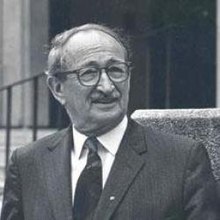
Back سيدني هووك Arabic سيدنى هووك ARZ Sidney Hook German Sidney Hook Spanish Sidney Hook Finnish Sidney Hook French Sidney Hook ID Sidney Hook Italian Sidney Hook Dutch Sidney Hook Portuguese
Sidney Hook | |
|---|---|
 Hook in late life | |
| Born | December 20, 1902 New York City, US |
| Died | July 12, 1989 (aged 86) |
| Alma mater | City College of New York Columbia University |
| Era | 20th-century philosophy |
| Region | Western philosophy |
| School | Pragmatism Marxism (early) |
Main interests | Political philosophy, philosophy of education |
Notable ideas | Ethics of controversy |
Sidney Hook (December 20, 1902 – July 12, 1989) was an American philosopher of pragmatism known for his contributions to the philosophy of history, the philosophy of education, political theory, and ethics. After embracing communism in his youth, Hook was later known for his criticisms of totalitarianism, both fascism and Marxism–Leninism. A social democrat, Hook sometimes cooperated with conservatives, particularly in opposing Marxism–Leninism. After World War II, he argued that members of such groups as the Communist Party USA and Leninists like democratic centralists could ethically be barred from holding the offices of public trust because they called for the violent overthrow of democratic governments.
- ^ Phelps, Christopher (1997). Young Sidney Hook: Marxist and Pragmatist. Cornell University Press. pp. 33–34 (Katz), 51 (Katz), 128-129 (Katz), 132 (influence). ISBN 0801433282. Retrieved 14 October 2018.
© MMXXIII Rich X Search. We shall prevail. All rights reserved. Rich X Search